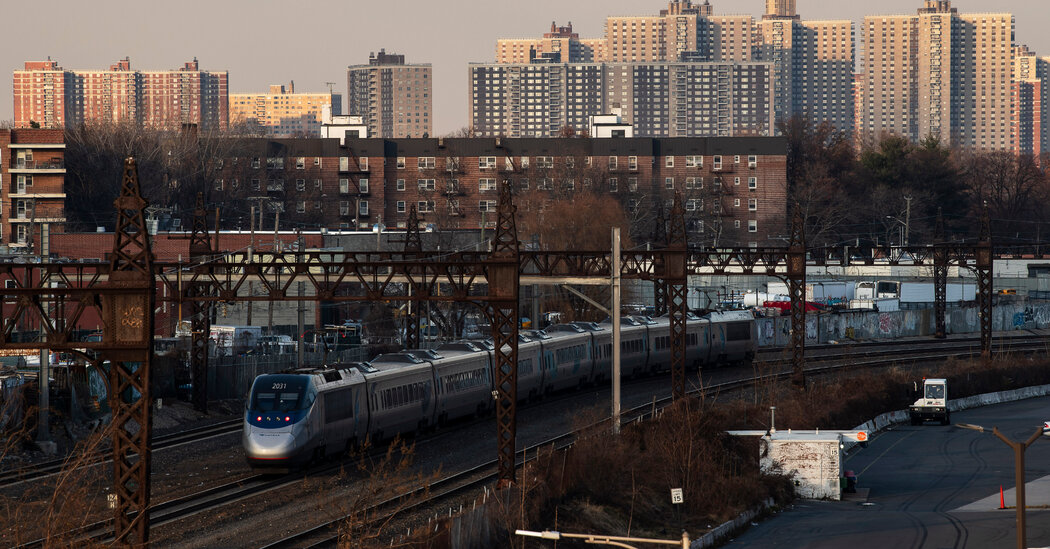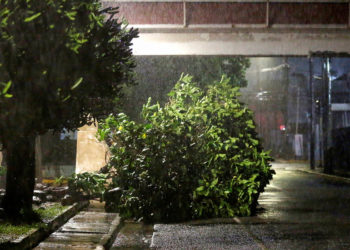Transit officials in New York City on Monday said that the completion of new rail stations in the Bronx could be delayed by three years until 2030, and they blamed Amtrak, their partner in the project, for slowing progress.
Officials with the Metropolitan Transportation Authority said that the Penn Station Access project, which would create four new Metro-North rail stations in the East Bronx, would provide much faster commutes to Pennsylvania Station, the Manhattan transit hub, and elsewhere in the region. The M.T.A., the state agency that runs the city’s mass transit network, operates the Metro-North commuter rail service and is leading the expansion project.
The roughly $2.9 billion project, which broke ground in 2022, was originally scheduled to be completed in March 2027, and was later pushed to the end of that year. The new stations — at Hunts Point, Parkchester, Morris Park and Co-Op City — would represent the commuter railroad’s biggest expansion since the 1980s. The delays are very likely to push the cost of the project higher.
The expansion would extend Metro-North’s New Haven train route along existing tracks that are owned by Amtrak, the national rail corporation whose majority owner is the federal government. The project would make repairs and improvements along 19 miles of the Hell Gate rail line that would largely benefit Amtrak, said Jamie Torres-Springer, the head of construction and development at the transit authority.
When completed, the project could add new transit options for 500,000 residents who live within a mile of the new stations. The Bronx is the poorest borough in the city, and a quarter of residents near the new stations live below the poverty line, according to the M.T.A.
But Mr. Torres-Springer said that construction has long been held up by Amtrak, which has limited access to the tracks. In a presentation on Monday, he said the M.T.A. was promised 48 weekend periods in which train service would be altered to allow construction crews access. But in the first two years of work, the M.T.A. said it was only granted seven of the promised windows for work.
“That set the project spiraling off in the wrong direction,” Mr. Torres-Springer said.
Compounding the delays was the frequent absence of Amtrak staff who were required to be on site for work, he said.
Sean Butler, a spokesman for Gov. Kathy Hochul, said that connecting Bronx communities to Metro-North service would transform neighborhoods. “The Bronx can’t wait: Governor Hochul is eager to get these trains running and wants Amtrak to work with the M.T.A. on a plan to start service as soon as possible,” he said.
Amtrak did not immediately respond to a request for comment, but in a statement earlier this month, it disputed the M.T.A.’s characterization of the work and said it was “meeting, and in many cases exceeding” expectations.
Janno Lieber, the chief executive of the M.T.A., who has criticized Amtrak for past partnerships that ran into delays and cost overruns, warned of history repeating itself.
“This is the M.T.A. trying not to repeat Eastside Access,” he said, referring to the long delayed and extraordinarily costly project to connect Long Island Rail Road to Grand Central Terminal that was completed in 2023.
M.T.A. officials said they may still be able to provide some of the proposed service at three of the four Bronx stations by the end of 2027 — all but Hunts Point — if Amtrak provides a plan that would allow construction to proceed on schedule.
The proposal would require more infrastructure work to be done before passengers could board trains from the stations, including building temporary staircases and platforms. But the compromise would enable the Metro-North to run 31 trains a day on the new stops, down from 105, while construction continues. The service would include five trains to Penn Station during the morning rush, and two more in the opposite direction.
In a letter to Amtrak demanding further cooperation on the project, the M.T.A. said it expected a response and a revised plan by Nov. 12, or else it might pursue legal action, including seeking damages.
In a statement, Representative Ritchie Torres, Democrat of New York, whose district includes parts of the Bronx that would use the service, also criticized Amtrak.
“The Bronx has fallen victim to Amtrak’s Kafkaesque bureaucracy, which has indefinitely delayed the Metro-North expansion,” he said.
Stefanos Chen is a Times reporter covering New York City’s transit system.
The post Metro-North Expansion in the Bronx Is Likely to Be Delayed by 3 Years appeared first on New York Times.




